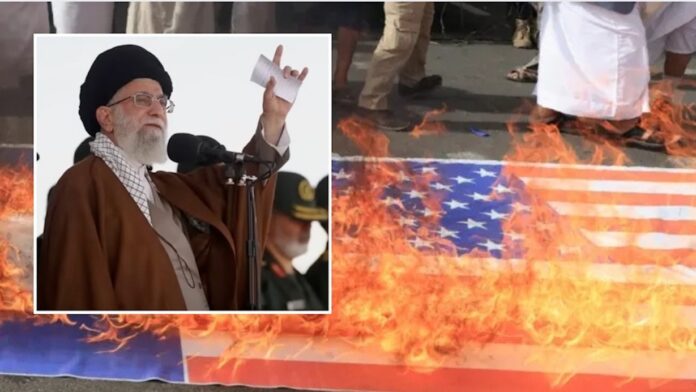- U.S. cities increase security around religious, cultural, and public sites after airstrikes on Iranian nuclear facilities.
- Experts warn of potential cyber attacks from Iran targeting critical U.S. infrastructure like banks, energy grids, and hospitals.
- Concerns rise over domestic terrorist threats, with officials fearing sleeper cells may already be active within the United States.
The mood was tense in major American cities this weekend as law enforcement scrambled to bolster defenses following the United States’ overnight military strikes on Iranian nuclear facilities. What began as a strategic assault overseas quickly rippled across the country, igniting anxiety from coast to coast and prompting heightened security around potential targets.
From New York to Los Angeles, and down to smaller towns tucked away in the Midwest, police presence surged. Officers stood watch outside churches, synagogues, mosques, consulates, and high-profile landmarks, unsure what might come next but determined to prepare for the worst.
Fear on the Ground: NYPD Leads Precautionary Efforts
Nowhere was the heightened alert more visible than in New York City. On Saturday night, shortly after news of the U.S. strikes broke, the NYPD activated its emergency protocols. Officers were ordered to fan out across the city, concentrating on areas seen as especially vulnerable—houses of worship, diplomatic missions, and iconic public spaces teeming with tourists.
The NYPD, known for its swift response and massive manpower, assured residents that they were in close contact with federal agencies, including the FBI and Homeland Security.
“Out of an abundance of caution, we’re deploying additional resources to religious, cultural, and diplomatic sites across NYC,” the department posted online. “We’ll continue to monitor for any potential impact.”
It was a measured message, but the subtext was clear: the city could be a target.
Across the five boroughs, residents noticed the shift almost instantly. Squad cars idled near popular churches in Brooklyn. Officers with bomb-sniffing dogs patrolled Times Square. Even suburban neighborhoods near JFK Airport reported seeing more patrols.
“There was this eerie feeling in the air,” said Amanda Rivera, a schoolteacher from Queens. “You could feel something had changed overnight.”
Across America, A City-by-City Response to Invisible Threats
New York may have taken the lead, but it wasn’t alone. In Chicago, police erected temporary barricades around major event venues – Washington, D.C., patrols increased near the Capitol and the White House. In Los Angeles, officers were spotted canvassing synagogues and museums in the Fairfax district, a hub of Jewish culture.
Even smaller cities responded swiftly. Local departments in places like Columbus, Ohio, and Boise, Idaho, confirmed they were tightening security. Many said they were monitoring “online chatter” and watching for any red flags connected to Iran or its allies.
“Soft targets” were the biggest worry—public gatherings, community events, or religious services where crowds gather but security is often minimal.
In St. Louis, the local department released a statement urging residents to remain “vigilant, but calm.” The city was preparing for its annual Pride parade, which draws thousands. Organizers confirmed the event would continue as planned but said extra police would be on hand.
National Security Experts Sound the Alarm
While many Americans focused on the risk of physical attacks, cybersecurity experts raised another red flag: digital warfare.
“People think of bombs and bullets, but Iran has a long history of launching aggressive cyber campaigns,” warned Jack McMillan, a former Department of Homeland Security advisor. “We’re talking about attacks on banks, power grids, hospitals. That kind of chaos can be just as damaging.”
McMillan said Iran possesses the technical capabilities to cause serious disruption and believes that key U.S. infrastructure—everything from public transportation systems to oil pipelines—is now in a defensive stance. He added that past incidents suggest Iran could retaliate through hackers aligned with the regime or independent actors sympathetic to its cause.
“Some of these actors are already embedded in U.S. networks,” he said. “It’s not a matter of if they’ll strike, it’s when and how.”
Sleeper Cells and Domestic Terror Worries Resurface
The fear that domestic terrorist cells—either directed by Iran or radicalized independently—might already be active within the United States added yet another layer of unease. Intelligence officials remained tight-lipped but didn’t deny the possibility.
“It’s a real concern,” said one federal counterterrorism official on condition of anonymity. “We’ve seen groups get activated after overseas escalations like this.”
The timing couldn’t be worse. Summer is in full swing, and cities are packed with festivals, parades, and tourist activity. The worry is that one coordinated attack—especially in a place considered a “soft target”—could spark widespread panic.
Across social media, anxious Americans voiced their fears. Some accused the government of escalating tensions unnecessarily. Others called for unity and urged neighbors to look out for one another.
“This isn’t about politics anymore,” tweeted one user in Michigan. “It’s about keeping our kids safe.”




